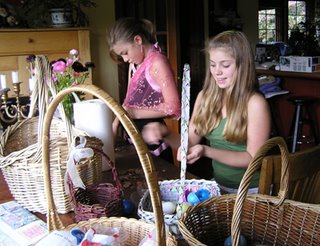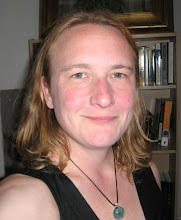 This was Frodo, he was my dog growing up. Once upon a time, he had an adventure, not unlike his namesake, Frodo the Hobbit, and lived to tell about it. Well, he didn't tell the story himself exactly, because that would be anthropomorphizing, which of course, we generally discourage on this website, but even though he went on his own adventure, we know exactly what transpired. In fact, every word of this story is absolutely true, because several different humans that were involved along the way remember what happened. Frodo the dog didn't live in the Shire, or Middle Earth. He lived in the Enchanted Lily Garden in Redmond.
This was Frodo, he was my dog growing up. Once upon a time, he had an adventure, not unlike his namesake, Frodo the Hobbit, and lived to tell about it. Well, he didn't tell the story himself exactly, because that would be anthropomorphizing, which of course, we generally discourage on this website, but even though he went on his own adventure, we know exactly what transpired. In fact, every word of this story is absolutely true, because several different humans that were involved along the way remember what happened. Frodo the dog didn't live in the Shire, or Middle Earth. He lived in the Enchanted Lily Garden in Redmond.
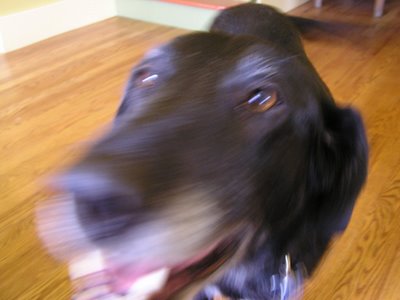
For the purposes of this story, the role of Frodo will be played by Katy the Dog, who was named for Katuete, a town in Paraguay that I have fond memories of from when I was a teenager. Katy the dog is no relation to Frodo, but joined the family when he started to get on in years. She's not as obssessive about balls as Frodo, but she does love to swim. Swimming is her thing, in the summer or the winter. Katy has her own story, involving a violin thief, a silver Airstream trailer, a sister named Maya, and a pet adoption center that was supposed to be a music store. But this is Frodo's story, so you will have to hear her story later and be content with her impersonating (indoggonating?) Frodo for now. As you can see from the picture, Katy is very well qualified to play the part of Frodo.

She has four white paws too and a white chest, and only very close members of the family and canine experts will know the difference. So she should be able to pull it off just fine.
Now Frodo was an adventurous sort of dog. Or at least, he liked to jump into people's cars when they had their windows rolled down. He would curl up on their seats for hours, and when someone wanted to leave, they were surprised to find the dog in their car.
One late summer day, my mother, who's an artist, and would often work all night in her shop to meet a deadline, needed to fill the white one-ton Ford pickup with gas. Not sure why she picked that moment, but on automatic pilot, she drove the two miles down to Avondale Road to the Shell station that sits on the same lonely corner as the F.O.E., or Fellowship of Eagles hall, a place where men are men, generally have grey hair, and they go to drink. She filled up the truck with gas, which took a while because it had two tanks. And then she drove home.

Now Frodo was a constant fixture in our lives, although I was off at college at the time, but he didn't go unnoticed for long. Even so, it was a day or two later when my mother realized that Frodo wasn't around. We had a farm, not exactly fenced in, but this was loyal Frodo, not like him at all. Not wanting to alarm me, my mother waited a few more days before telling me of his absense. I was shocked. Frodo was the best dog ever, there was no way something could have happened to him. No, he had to show up. He'd been my good pal since he was a puppy and I was 13 or 14. But I was in Portland. What could I do. I came home. I knew he must be somewhere, so I headed to the animal shelter in Kent. Please please please deity that doesn't exist, let him be there, please! But no Frodo the dog, not in the animal shelter. What if he had been hit by a car? We put up signs, with his picture, the very one at the beginning of this story. I couldn't stay forever, I had to head back to school. I was crushed. As time passed, the chances that I would ever see Frodo again became slimmer and slimmer. I had to come to terms, my favorite dog, my obsessive ball-chaser who would crawl behind a couch and jump off an eight foot porch and wander in the woods for hours looking for a tennis ball, he was dead.
Nothing seemed right, school was a daze, Frodo the dog was gone. Then one day, my mother received a call from out of the blue.
The lady on the other end of the line simply said, "I think I found your dog, but I don't have him anymore."
A million questions. Well, where is he, what happened to him? If you don't have him, who does?
It was a late summer day. The woman had been checking up on some old friends at the F.O.E. on Avondale Road with some friends, but was about to head home, when out of the corner of her eye, she saw the dog. He was friendly, sitting by the door to the gas station, looking like he was waiting patiently for his person to come back. But as time passed, his person didn't come back. So he kept waiting.
He must have jumped in the open window of the truck, the day my mother drove it to the gas station in a daze, and jumped out when they arrived. Since my mother didn't notice that he had come along for the ride, she didn't notice his absense on her way home.
The woman couldn't just leave him at the gas station, such a friendly dog, and he jumped right into her car. She took him home. Everything would have been just fine, but her own dog did not care for Frodo at all. Frodo was easy-going. Her dog was not. Frodo would be happy to chase balls all day, but the new dog wouldn't let him. So the lady had to make a decision. She had to give Frodo away.
But a month later, she saw the signs. She was buying milk at Theno's Dairy, and there he was, the perky dog she had found at the gas station, and he had a home.
"I found your dog, but I don't have him anymore. I gave him to a man named Bob."
"Who's Bob?" Asked my Mom.
"A guy who hangs out at the Eagles Hall."
"Can I have his phone number?"
"Well, he doesn't have a phone."
"How can I reach him, then?"
"You can try calling the Eagles Hall."
So my mom called the Eagles Hall.
"Yeah, this is Bob."
"I think you have my dog, Frodo. A black dog, really friendly, with four white paws."
"I have your dog. But I'm not giving him back."
My mother's heart sank. Not give Frodo back? Frodo, the wonder dog? Frodo, the best dog ever? This was not possible. Of course, someone would love Frodo as much as we did. After all, he was the best dog ever. Certainly, an older guy with a lonely life would find him a great companion.
"Look, I need my dog back."
No dice.

The lady had told my mother that Bob lived somewhere on Education Hill, but she wasn't sure where. My mother was desperate. One day, she got in the truck with Sparky, our old white husky. Sparky had been left in the front seat of the car of one of my mother's friends when it was parked outside a grocery store when he was only a puppy, so he became my brother's dog. Sparky was a good and sweet dog, but never the sharpest stick in the bunch, not like Frodo. He was allergic to his own skin, and fleas, and arthritic now, and had been hit by a car when he was young, so his bones were bugging him. But Sparky was loyal. Together, my mother and Sparky rumbled their way around Union Hill to an area peppered with the occasional mobile home. Parking the truck at the end of a driveway, my mother got out and walked up to a door and knocked. A girl answered.
"Do you know a guy named Bob?" My mother asked the girl.
"Naw, we pretty much keep to ourselves around here," was the reply.
Turning around, my mother headed back up the driveway. When she got near the truck, there was Frodo, wagging his tail by the truck, happy to see her and Sparky, and ready to jump back in the open window.

And that is the story of Frodo's incredible true-life adventure. He lived happily ever after till the ripe old age of 14, and my mother always checked the windows and the passenger's seat from then on.
Copyright 1996-2006 Susanne Bard
 Les Fabulous Girls du Oeste Coast played at Folklife on May 26, 2005, and someone made a video of it. Fortunately, I am hidden for most of the video behind a music stand.
Les Fabulous Girls du Oeste Coast played at Folklife on May 26, 2005, and someone made a video of it. Fortunately, I am hidden for most of the video behind a music stand.

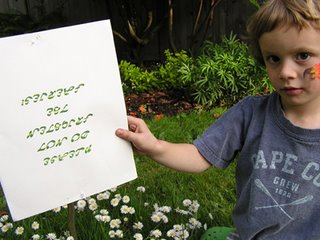
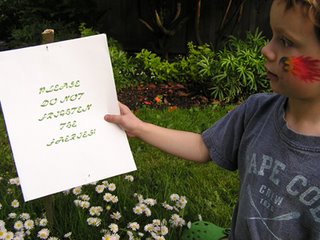 Of course the sign could be just as effective right-side-up.
Of course the sign could be just as effective right-side-up. Reggie (the birthday girl in the red shirt) and friends cut the cake, baked by neighbor Robin.
Reggie (the birthday girl in the red shirt) and friends cut the cake, baked by neighbor Robin.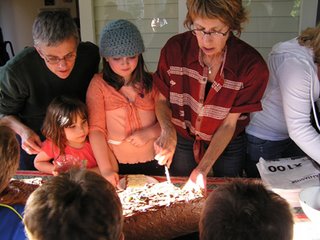




 This was Frodo, he was my dog growing up. Once upon a time, he had an adventure, not unlike his namesake, Frodo the Hobbit, and lived to tell about it. Well, he didn't tell the story himself exactly, because that would be anthropomorphizing, which of course, we generally discourage on this website, but even though he went on his own adventure, we know exactly what transpired. In fact, every word of this story is absolutely true, because several different humans that were involved along the way remember what happened. Frodo the dog didn't live in the Shire, or Middle Earth. He lived in the Enchanted Lily Garden in Redmond.
This was Frodo, he was my dog growing up. Once upon a time, he had an adventure, not unlike his namesake, Frodo the Hobbit, and lived to tell about it. Well, he didn't tell the story himself exactly, because that would be anthropomorphizing, which of course, we generally discourage on this website, but even though he went on his own adventure, we know exactly what transpired. In fact, every word of this story is absolutely true, because several different humans that were involved along the way remember what happened. Frodo the dog didn't live in the Shire, or Middle Earth. He lived in the Enchanted Lily Garden in Redmond. 






